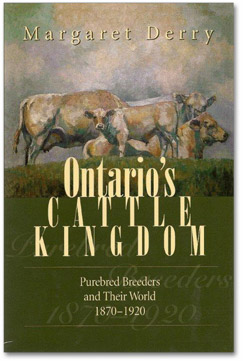The complexity of agricultural and social history in post-Confederation Ontario through a study of beef cattle and livestock farming. Based on abundant original research linking science, agriculture, business and the state, Ontario’s Cattle Kingdom explores the significance of beef cattle and livestock farming in Ontario during the late nineteenth and early twentieth century.
Synopsis:
Margaret Derry concentrates much of her research on the herds themselves (purebred and otherwise), using them as cultural texts to explain patterns of innovation adoption and the problems with strategies to control market share.
The result is a fascinating and lively work, illustrating the complexity of agricultural history and offering an entirely new perspective on the social history of post-Confederation Ontario. The story of the purebred cattle breeders’ world, for example, also describes the medical opinions of the nineteenth century, as well as disease control and the relationship between human and animal illness. And the stories are many: the evolution of cattle associations and organizations, the impact of technological progress on purebred herds, attempts to control disease and state regulation, and the relationship between the producers and consumers. Drawing from a wealth of historical case studies, Derry also presents the purebred breeders’ theories and practices, their views on genetics and eugenics, as well as the implications of these practices on national and international patterns of beef economy.
Reviews:
“Derry presents a history of breeding programs for shorthorn cattle, collies, and Arabian horses in Britain and North America since 1800. Focusing on the tensions between science, aesthetics, and the profit motive, she describes how market forces have shaped the modern definition of “perfection.” Coverage extends to a discussion of how certain international trade regulations affected the evolution of the purebred animal industry.”
– Book News, Inc [American]
“Margaret Derry’s welcome volume fill a discernable lacuna in historical knowledge and goes far to demystify a subject that previously seemed impenetrable. Derry assumes a unique approach in the Canadian context through focusing on the animals and herds as much as the people. Margaret Derry has managed to breathe life and form into an engaging subject that had lain inchoate prior to her investigations.”
– Ontario History, Fall 2001. [Ontario]
“Derry has assembled a lot of useful information on the cattle industry in Ontario. She offers numerous insights into features of development of one of Canada’s Major industries.”
Canadian Historical Review, vol 83, 2002. [Canadian]
“This well-researched and well-argued volume is a welcome contribution to the agricultural history of Canada and North America. Derry brings a unique perspective to her study. In seven well-constructed chapters Derry conducts the reader through the evolution of a critical, but largely unappreciated industry.”
– Agricultural History, vol 76, 2002. [American]
“Margaret Derry treats a subject often overlooked even by agricultural historians. A professional historian who raises purebred cattle in Ontario, Derry explores a wide array of issues connected with or affecting the world of purebred breeders during the half century after 1870.”
– American Historical Review, vol 107, 2002. [American]
“All in all, it is a model study, and it is not too surprising to learn that the author’s sure historical scholarship is built on solid foundations of praxis. The jacket bears testimony to the author’s talents as a livestock artist.”
– Agricultural History Review, vol 50, 2002. [British]
“It is a glimpse at the world of cattle breeders in days gone by, when genetic improvement was still in its infancy. Derry believes cattle breeding is till very much an art today, as it was then.”
– Ontario Beef Farmer, early fall, 2002. [Ontario]
“She captures the essence of cattle on canvas enough to take any life-long cowboy’s breath away. Man’s contemporary history with these beasts, she captures in the book.”
– Ontario Dairy Farmer, October 2002. [Ontario]
